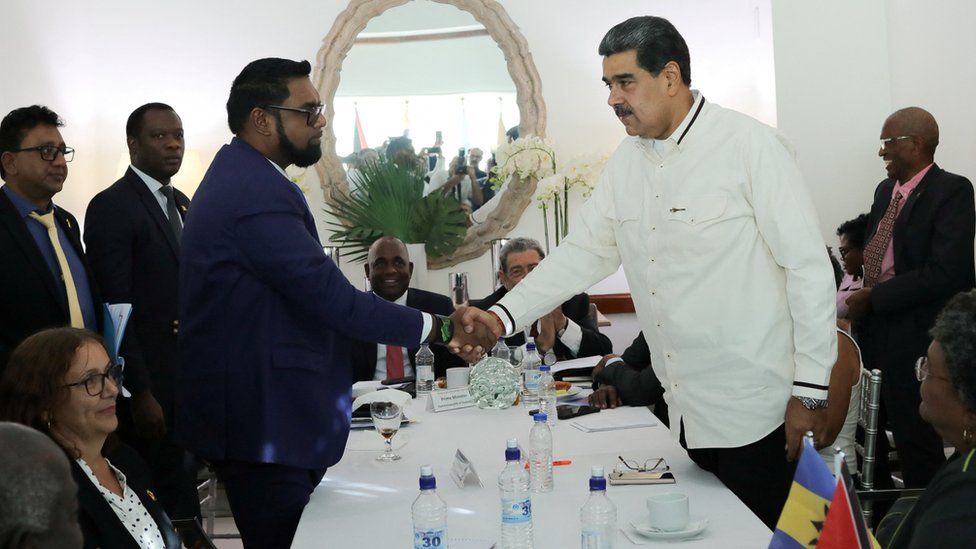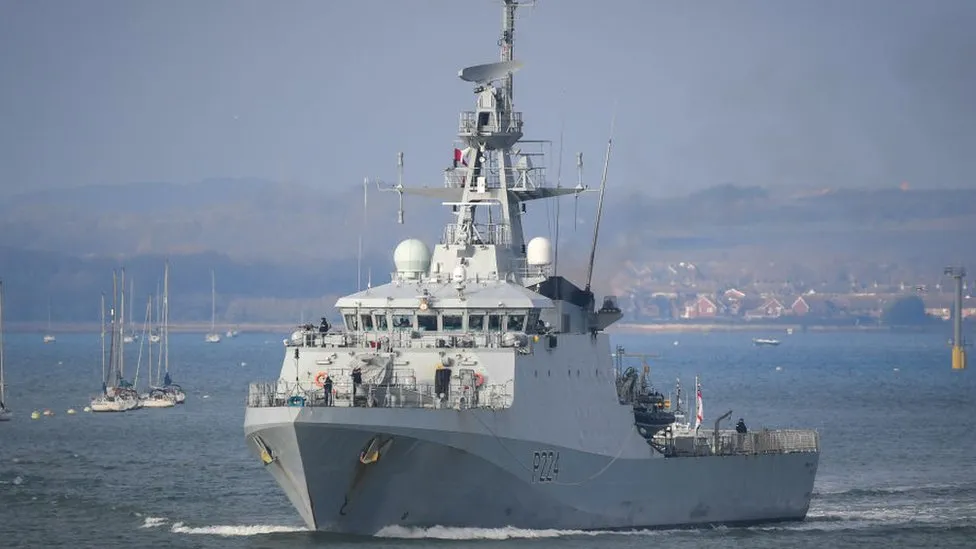The United Kingdom is gearing up to dispatch a warship to Guyana as a demonstration of both diplomatic and military support for the former British colony, according to BBC sources.
This move comes in response to renewed claims by neighboring Venezuela over a disputed part of Guyanese territory, known for its abundant oil and mineral resources.
The Ministry of Defence has confirmed that HMS Trent, an offshore patrol vessel originally tasked with drug-smuggling interdiction in the Caribbean, will engage in joint exercises with Guyana after the Christmas season.
The decision to redirect HMS Trent was prompted by Venezuela’s recent threats to annex the Essequibo region of Guyana, heightening concerns of a potential invasion and the specter of South America’s first interstate war since the Falklands Conflict in 1982.
As South America’s sole English-speaking nation and a member of the Commonwealth, Guyana finds itself at the center of this territorial dispute.
Venezuela has persistently asserted ownership over Essequibo, a sprawling 61,000 square mile region that encompasses a significant portion of Guyana. Notably rich in gold, diamonds, bauxite, and with substantial offshore oil deposits, the region has become a focal point of contention between the two nations.
While Guyana’s economy is experiencing rapid growth, Venezuela faces severe economic challenges. President Nicolas Maduro of Venezuela conducted a controversial referendum on December 3 to reaffirm popular support for the country’s claim to Essequibo, a move widely contested. Despite challenges to the results, Maduro proceeded to publish new maps and legislation, officially incorporating Essequibo into Venezuela. He appointed a new governor, offered identity cards to residents, and directed the state oil company to issue extraction licenses in the disputed region.
Following a meeting with Guyana’s President Irfaan Ali, Maduro committed to avoiding the use of force. However, he maintains his territorial claim, and both nations remain in disagreement over the legal resolution of the border dispute.
This heightened tension has led the Lloyd’s insurance market in London to designate Guyana as one of the riskiest shipping zones, reflecting the uncertainty and potential hazards arising from the ongoing territorial dispute.
A Ministry of Defence spokesperson told the BBC: “HMS Trent will visit regional ally and Commonwealth partner Guyana later this month as part of a series of engagements in the region during her Atlantic Patrol Task deployment.”
HMS Trent has a crew of 65, a top speed of 24 knots and a range of 5,000 nautical miles.
It is armed with 30mm cannon and a contingent of Royal Marines. It can also deploy Merlin helicopters and unmanned aircraft.
HMS Trent left its home port of Gibraltar in early December and is currently alongside in Bridgetown, Barbados for Christmas.
The warship is expected to anchor off the capital of Guyana, Georgetown, and conduct visits, joint activities and training with the country’s navy and other allies. It cannot go alongside because the port is too shallow.
The vessel is mainly used for tackling piracy and smuggling, protecting fisheries, counterterrorism, providing humanitarian aid, and search and rescue operations, but the Royal Navy says it is also designed for border patrols and defence diplomacy.
The decision to send HMS Trent to Guyana is part of a growing UK effort to show international diplomatic support for Guyana.

This week the Foreign Secretary Lord Cameron said the UK would “continue to work with partners in the region to ensure the territorial integrity of Guyana is upheld and prevent escalation”.
David Rutley, the Foreign Office Minister for the Americas, visited Georgetown on 18 December, the first G7 representative to do so since Venezuela renewed its claim.
He promised Guyana the UK’s “unequivocal backing” and welcomed Venezuela’s promise to avoid using force.
Mr Rutley continued: “The border issue has been settled for over 120 years. Sovereign borders must be respected wherever they are in the world.
“The UK will continue to work with partners in the region, as well as through international bodies, to ensure the territorial integrity of Guyana is upheld.”
Venezuela’s Foreign Minister, Yvan Gil, criticised the visit, accusing the UK of destabilising the region.
In a post on X – formerly Twitter – he said: “The former invading and enslaving empire, which illegally occupied the territory of Guayana Esequiba and acted in a skilful and sneaky manner against the interests of Venezuela, insists on intervening in a territorial controversy that they themselves generated.”
Venezuela disputes the border which was established under an international agreement in 1899.
Guyana was formerly known as British Guiana before it secured its independence in 1966.

